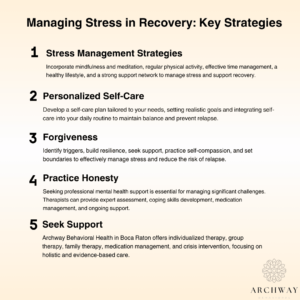Professionals in recovery often juggle demanding careers with the challenges of maintaining sobriety. Chronic stress can be a significant trigger for relapse, making effective stress management crucial.
Mindfulness and Meditation
These practices help individuals focus on the present moment, reducing anxiety and promoting relaxation.
Physical Activity
Regular exercise releases endorphins, improves mood, and reduces stress levels.
Time Management
Effective time management techniques can help prioritize tasks, reduce overwhelm, and create a sense of control.
Healthy Lifestyle
Prioritizing sleep, nutrition, and hydration supports overall well-being and stress resilience.
Building a Support Network
Connecting with supportive friends, family, or recovery groups can provide emotional support and reduce feelings of isolation.
Creating a Personalized Self-Care Plan
Developing a personalized self-care plan is essential for managing stress and promoting overall well-being. By identifying your unique needs and preferences, you can create a routine that supports your recovery journey.
Understanding Your Needs:
- Reflect on your personal stressors and challenges.
- Identify activities that bring you joy and relaxation.
- Consider your physical and emotional limitations.
Setting Realistic Goals:
- Start with small, achievable goals and gradually increase the frequency and intensity of self-care activities.
- Prioritize self-care, even when life gets busy.
- Celebrate small successes to stay motivated.
Incorporating Self-Care into Daily Life:
- Schedule regular self-care time.
- Find opportunities for mindfulness throughout the day.
- Create a relaxing environment at home.
- Seek support from loved ones to encourage self-care practices.
Overcoming Challenges and Relapse Prevention
Maintaining sobriety while managing the demands of professional life requires ongoing effort and resilience. By developing effective coping strategies, individuals can overcome challenges and reduce the risk of relapse.
- Identifying Triggers: Recognizing situations or emotions that may trigger stress or cravings is crucial for developing effective coping mechanisms.
- Building Resilience: Developing resilience helps individuals bounce back from setbacks and maintain a positive outlook.
- Seeking Support: Connecting with others in recovery, such as through support groups, can provide valuable guidance and encouragement.
- Practicing Self-Compassion: Treating yourself with kindness and understanding is essential for long-term recovery.
- Setting Boundaries: Learning to say no and establishing healthy boundaries can help manage stress and prevent burnout.
The Importance of Seeking Professional Help
While self-care strategies can be effective in managing stress, seeking professional help is crucial for individuals facing significant challenges or persistent symptoms. A mental health professional can provide specialized guidance, support, and treatment.
Benefits of Seeking Professional Help:
- Expert Assessment: A therapist can evaluate your specific needs and develop a tailored treatment plan.
- Coping Skills Development: Learn effective strategies for managing stress, anxiety, and other challenges.
- Medication Management: If necessary, a psychiatrist can prescribe medication to address underlying mental health conditions.
- Support and Accountability: A therapist can offer ongoing support and encouragement throughout your recovery journey.
Overcoming Stigma:
It’s important to remember that seeking help for mental health is a sign of strength, not weakness. Overcoming the stigma associated with mental health is crucial for accessing the care you need.
Finding the Right Therapist: Your Path to Well-being
Selecting the right therapist is a crucial step in your journey to improved mental health. Consider the following factors when making your decision:
- Specialization: Look for a therapist with experience in treating your specific concerns, such as anxiety, depression, or trauma.
Therapeutic Approach: Different therapists offer various therapeutic approaches. Research cognitive-behavioral therapy (CBT), dialectical behavior therapy (DBT), or other modalities that resonate with you.
- Insurance and Cost: Consider your insurance coverage and the therapist’s fee structure to ensure affordability.
- Geographic Location: Choose a therapist who is conveniently located or offers telehealth options.
Initial Consultation: Most therapists offer a free or low-cost initial consultation to discuss your needs and determine if they are a good fit.
Archway Behavioral Health in Boca Raton, Florida is committed to providing exceptional mental health care. Our team of experienced professionals offers a comprehensive range of mental health treatment services tailored to meet the unique needs of each individual.
Our Services
- Individual Therapy: Personalized one-on-one sessions to address specific mental health concerns.
- Group Therapy: Connect with others facing similar challenges in a supportive group setting.
- Family Therapy: Strengthening family relationships and promoting open communication.
- Medication Management: Collaborating with psychiatrists to optimize medication treatment plans.
- Crisis Intervention: Providing immediate support during mental health crises.
We believe in a holistic approach to mental health, focusing on the whole person rather than just the symptoms. Our treatment plans are individualized and incorporate evidence-based therapies to promote lasting recovery.
Choose Archway Behavioral Health for your mental health journey, call us at: (888) 488-4103 or fill the contact form. We are dedicated to helping you achieve your goals and live a fulfilling life.
FAQs on Stress for Professionals in Recovery
Can stress lead to relapse?
Yes, stress can be a significant trigger for relapse, as it can overwhelm coping mechanisms and create vulnerability.
How does substance abuse history impact stress response?
Individuals with substance abuse history may have heightened stress responses due to brain changes and past trauma.
How can I balance work and recovery?
Setting boundaries, prioritizing tasks, and delegating responsibilities can help manage work-life balance.
Is it okay to seek professional help for stress management in recovery?
Absolutely, seeking professional guidance is a sign of strength and can provide valuable tools for managing stress.
What types of mental health services does Archway Behavioral Health offer?
Archway Behavioral Health offers a range of services including individual therapy, group therapy, family therapy, medication management, and crisis intervention.
Do you accept insurance?
Archway Behavioral Health accepts most major insurance plans. It’s advisable to contact your insurance provider to verify coverage.
What is the typical length of treatment at Archway Behavioral Health?
The length of treatment varies depending on individual needs and treatment goals. Our team will develop a personalized treatment plan for each client.



